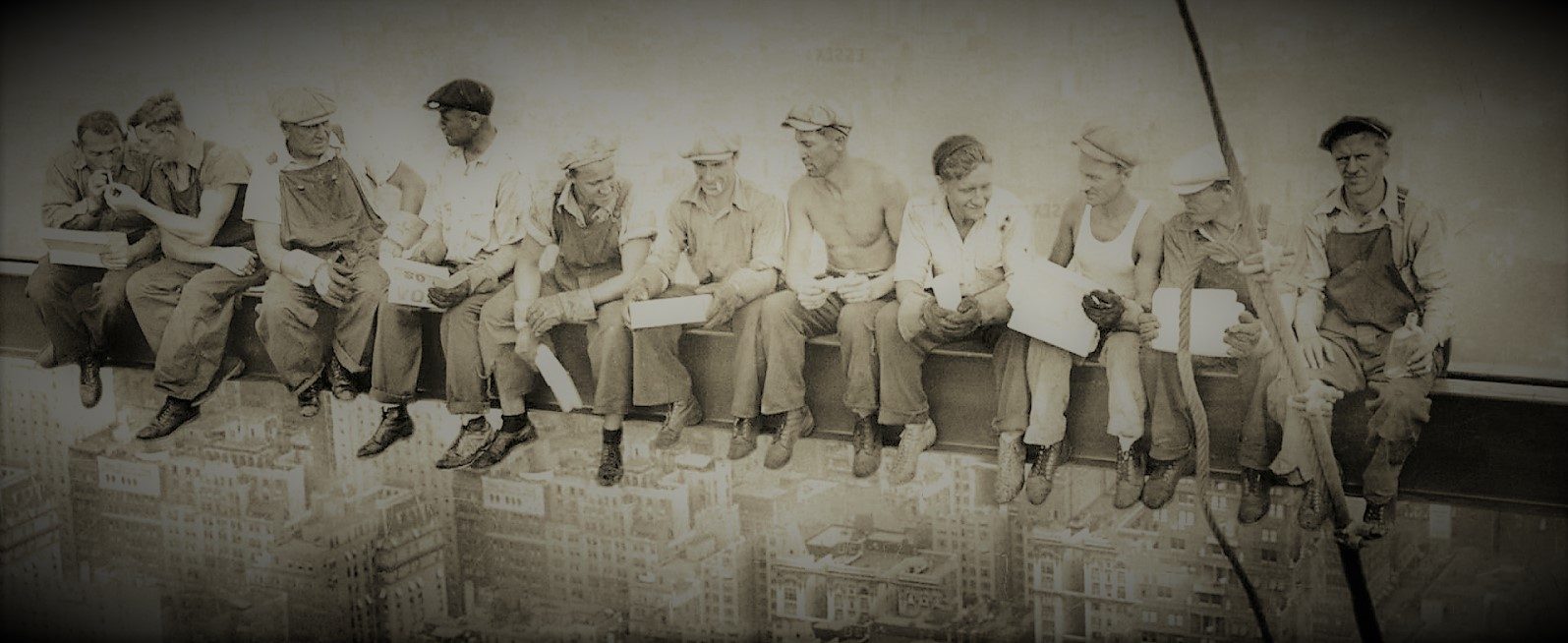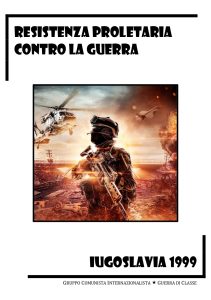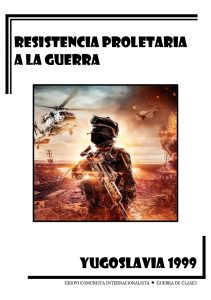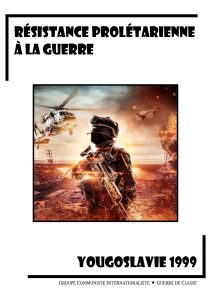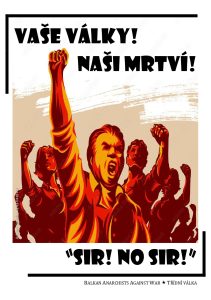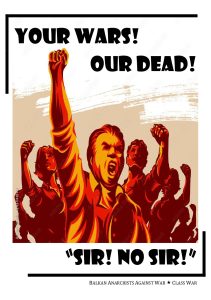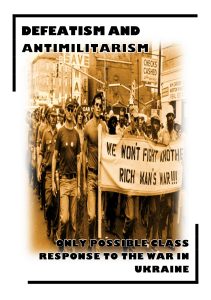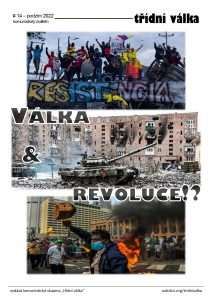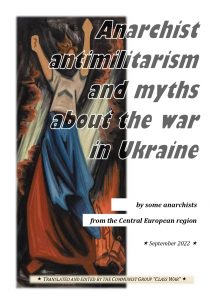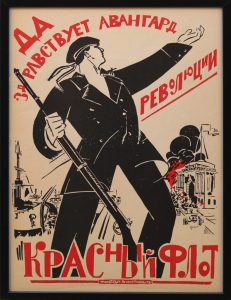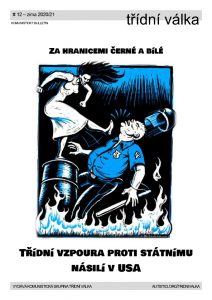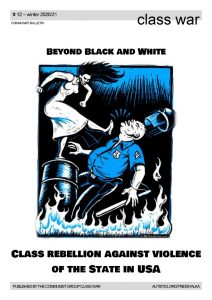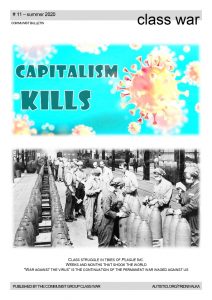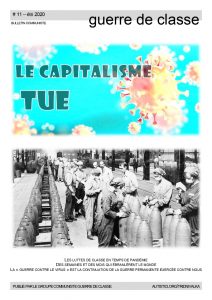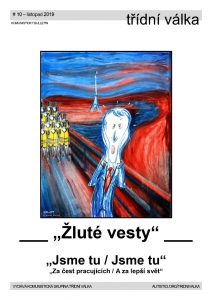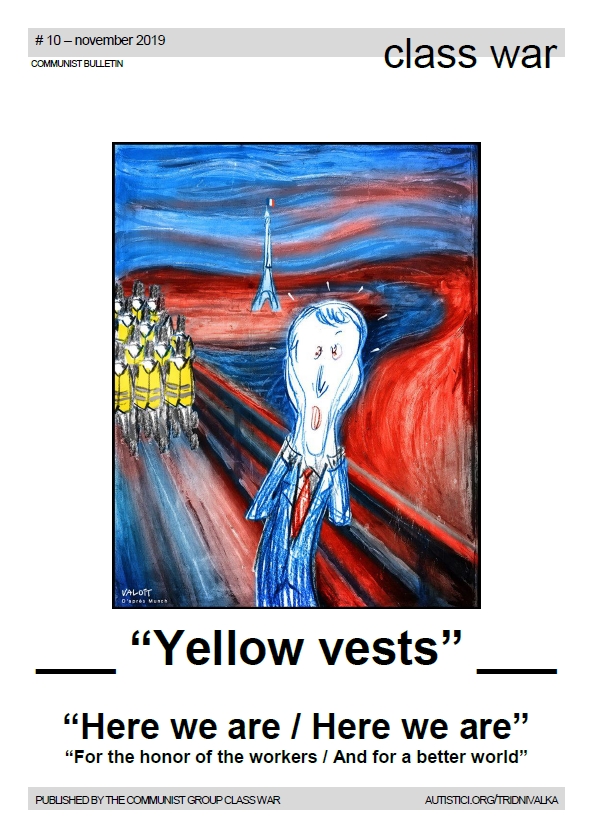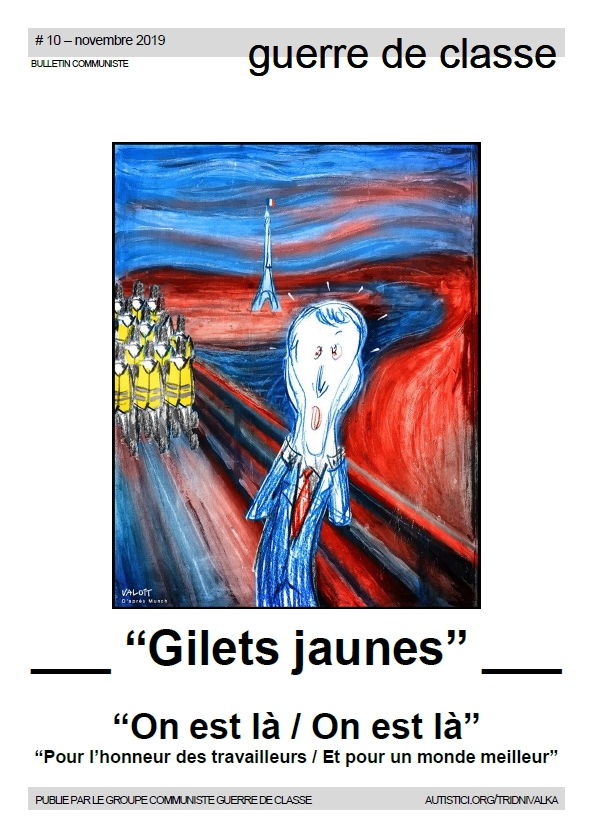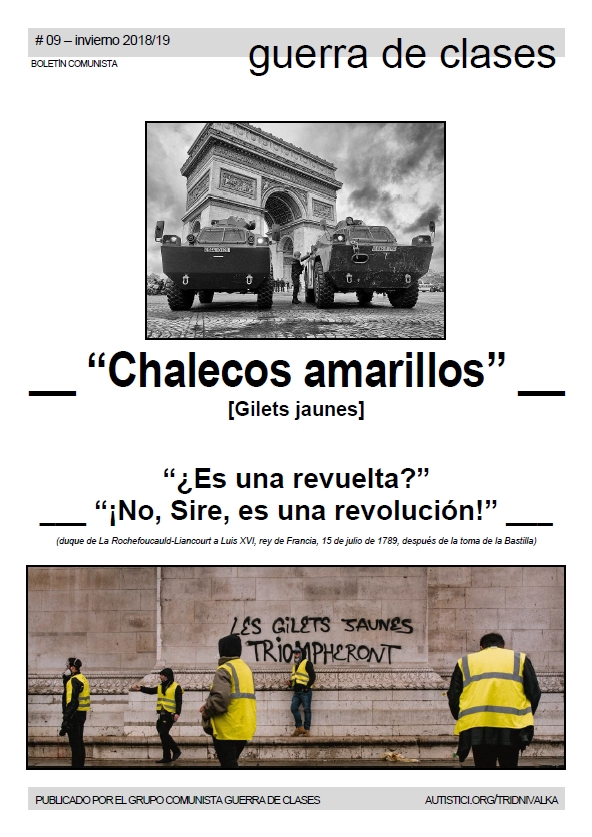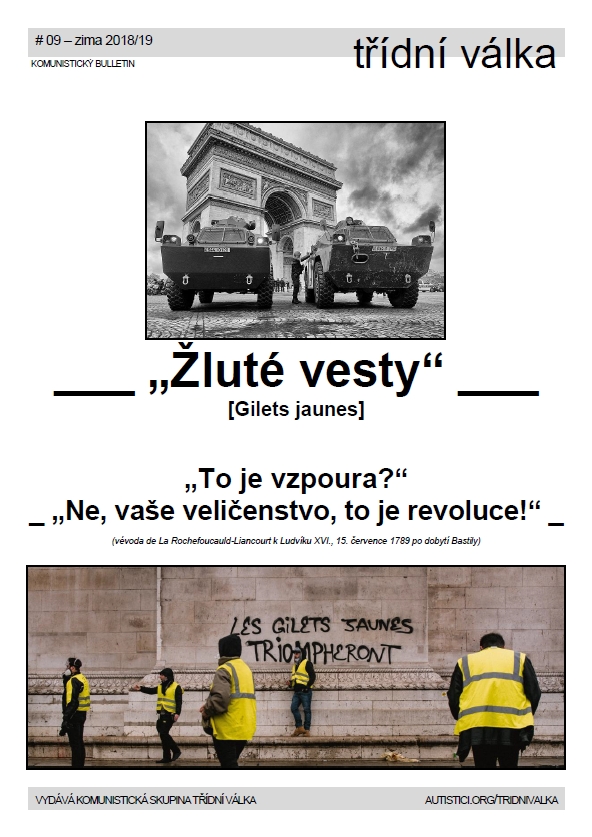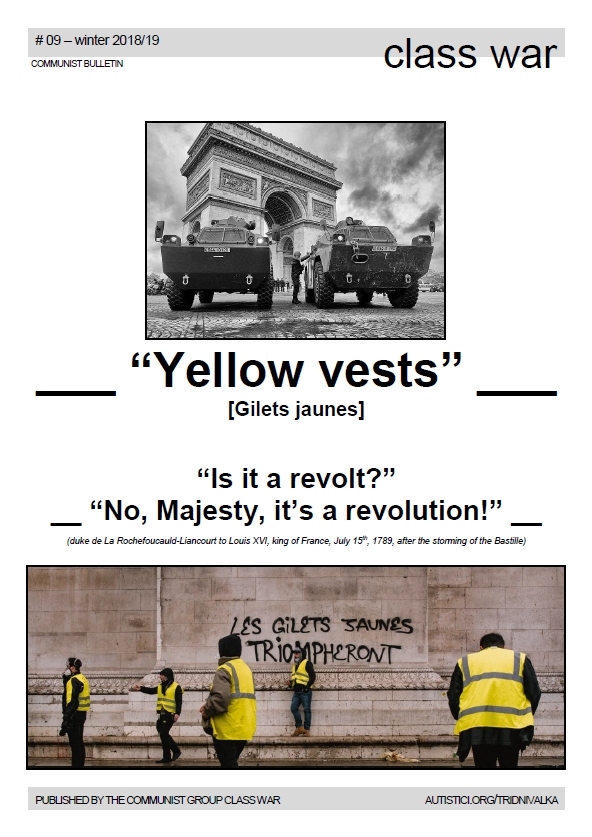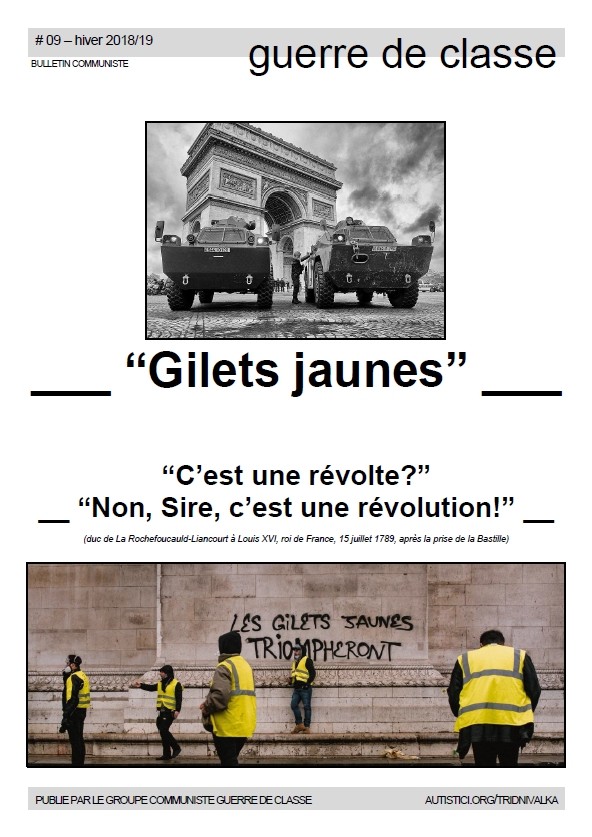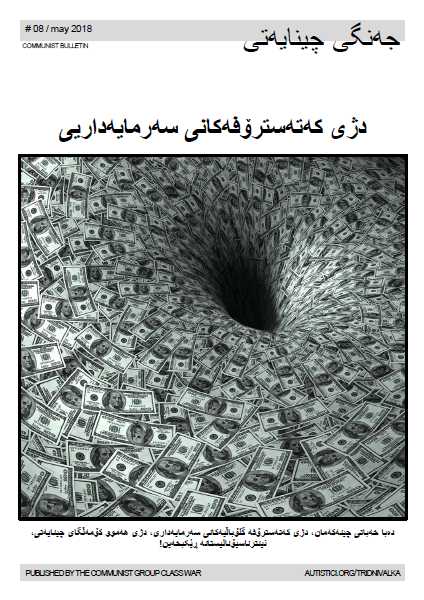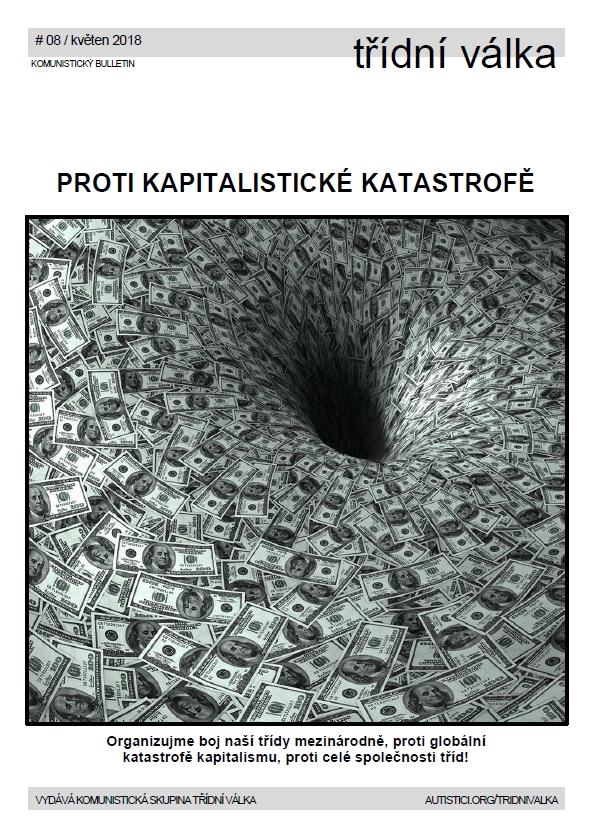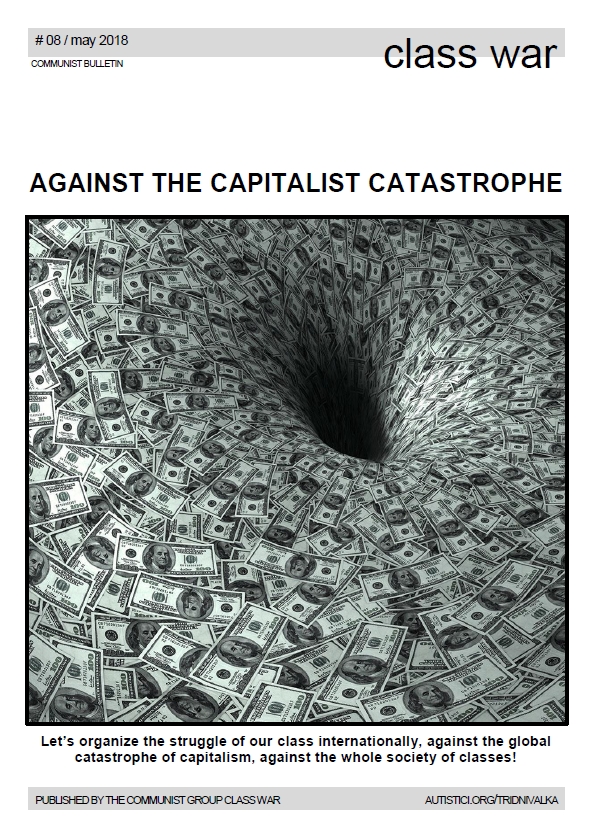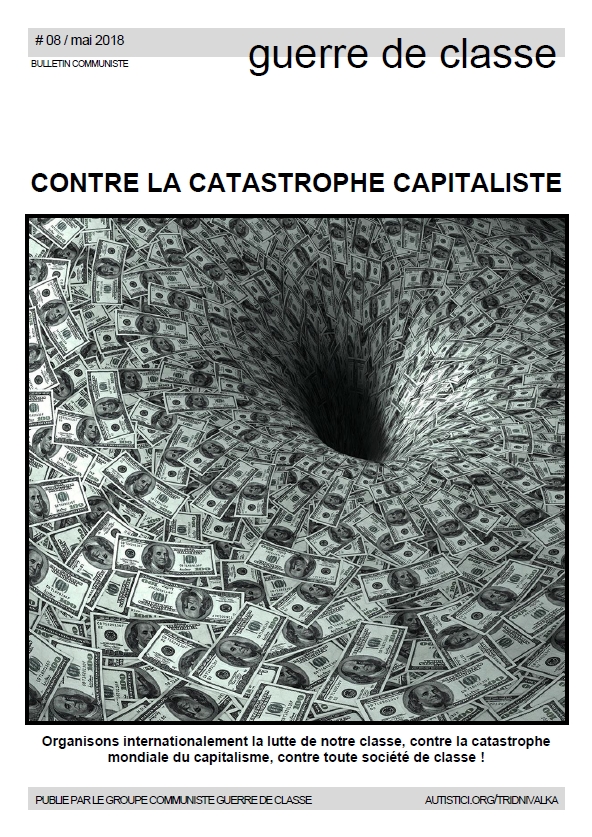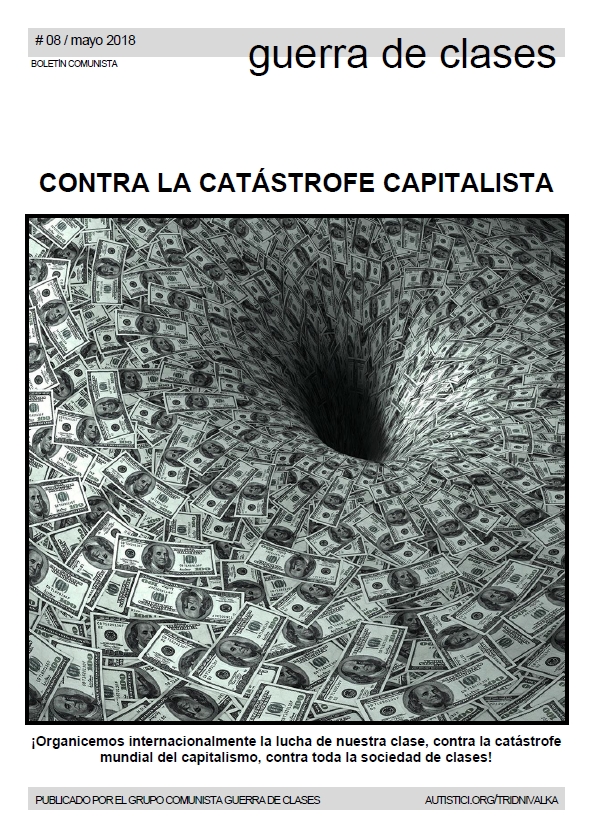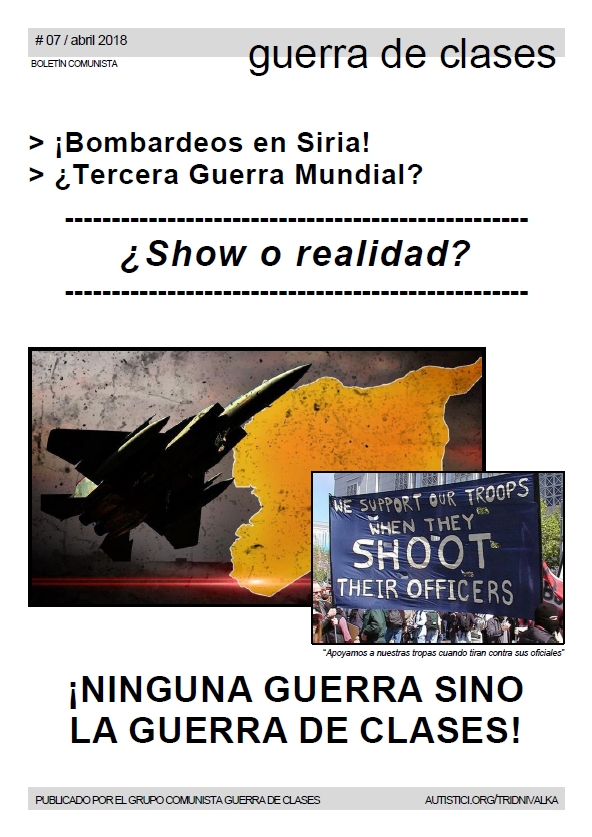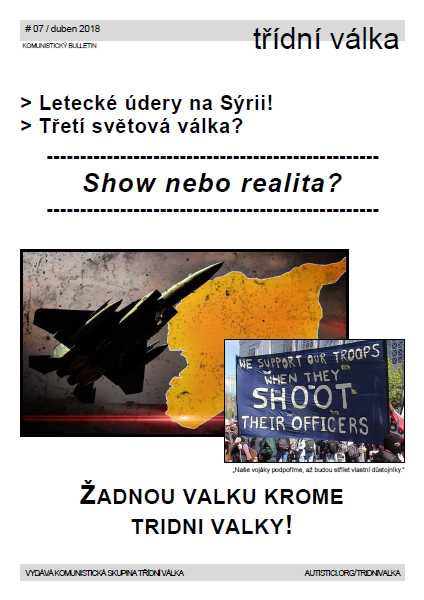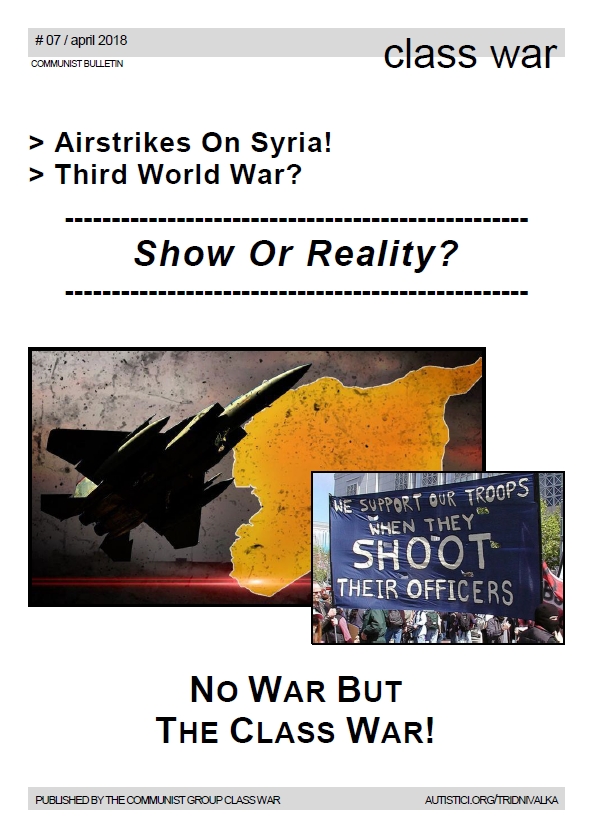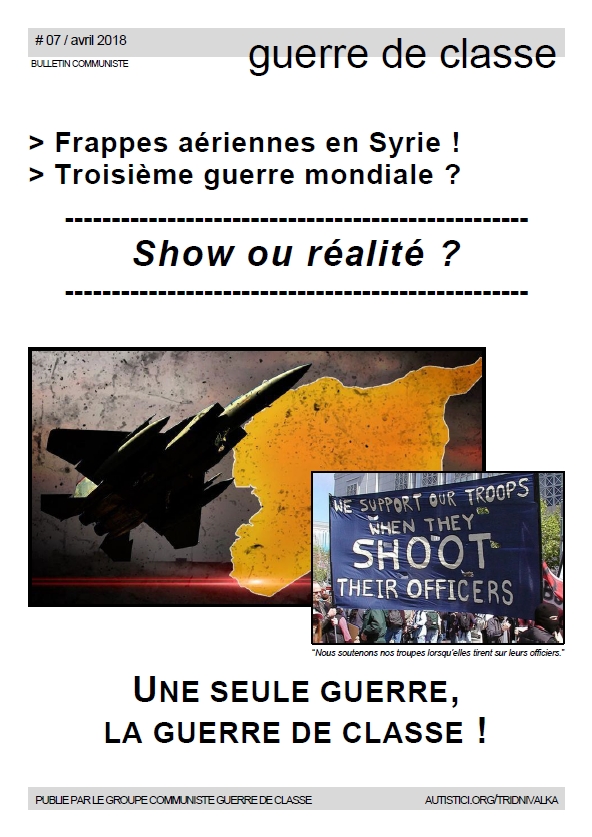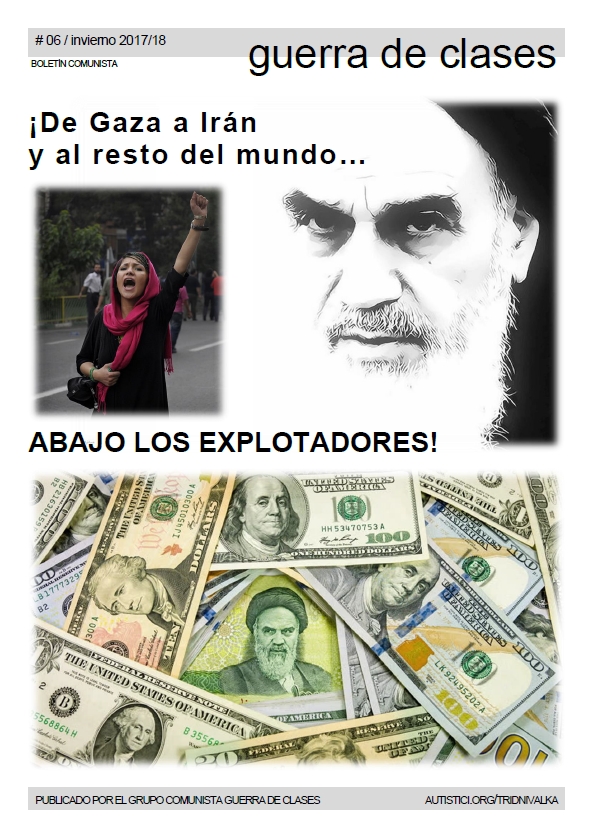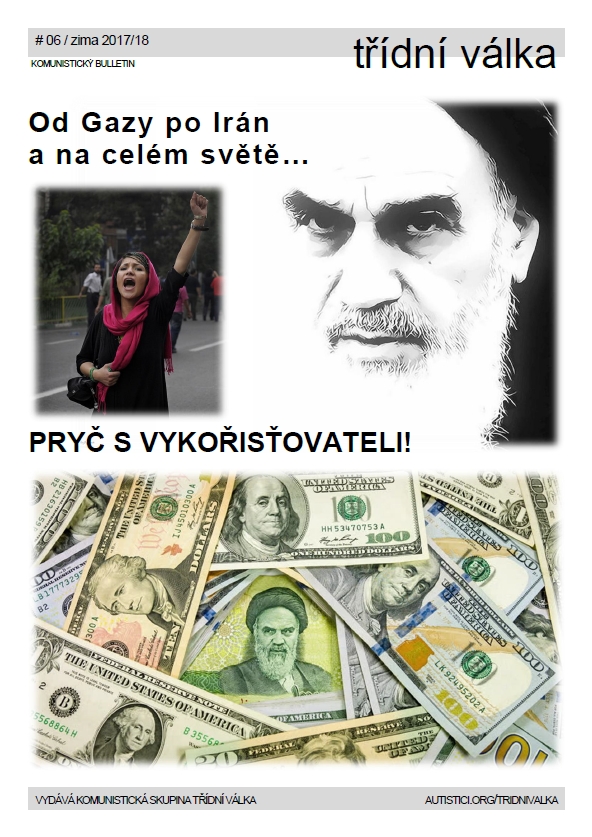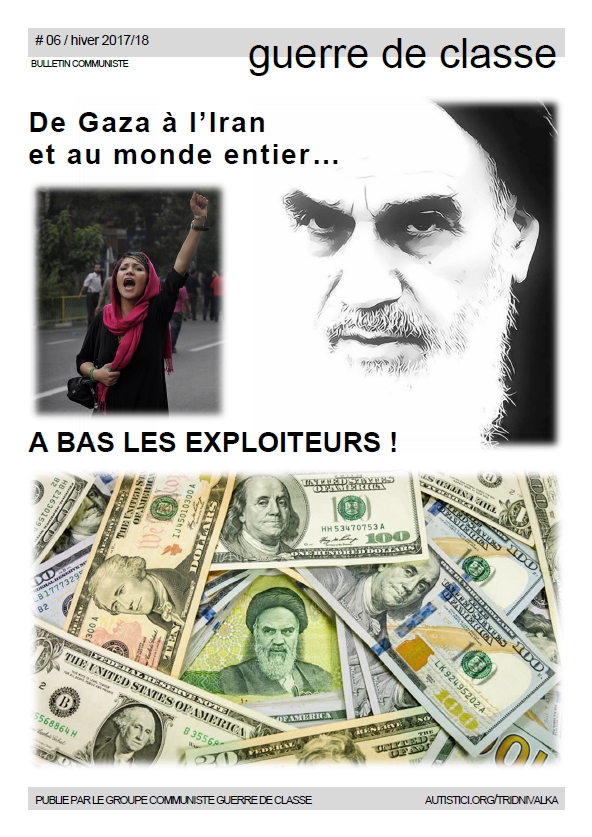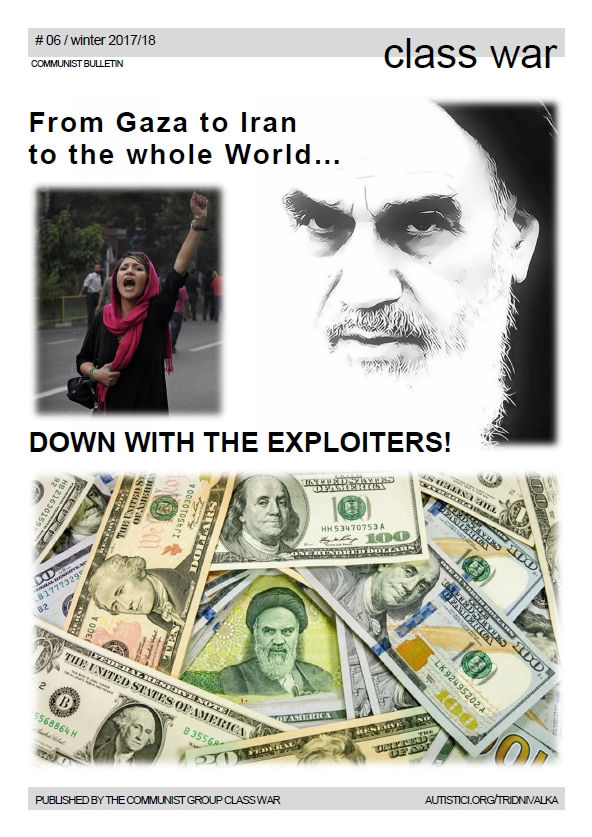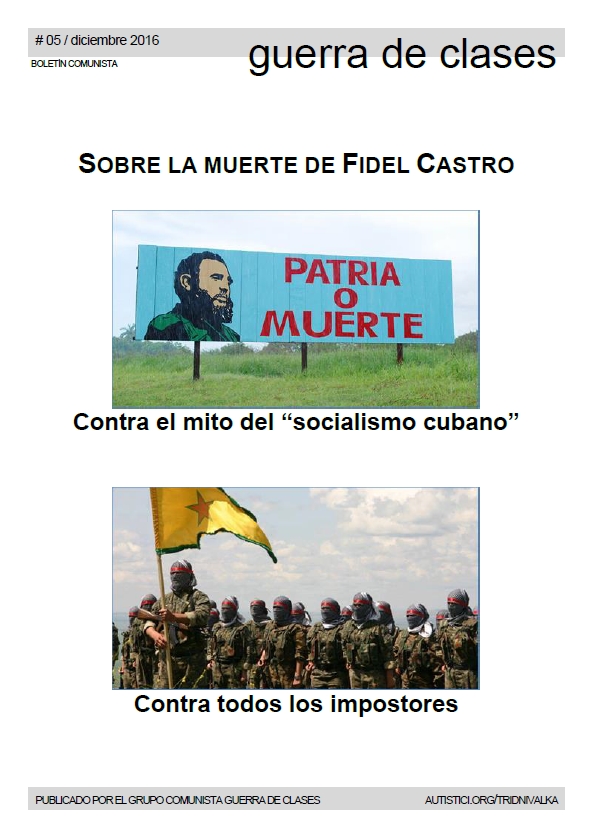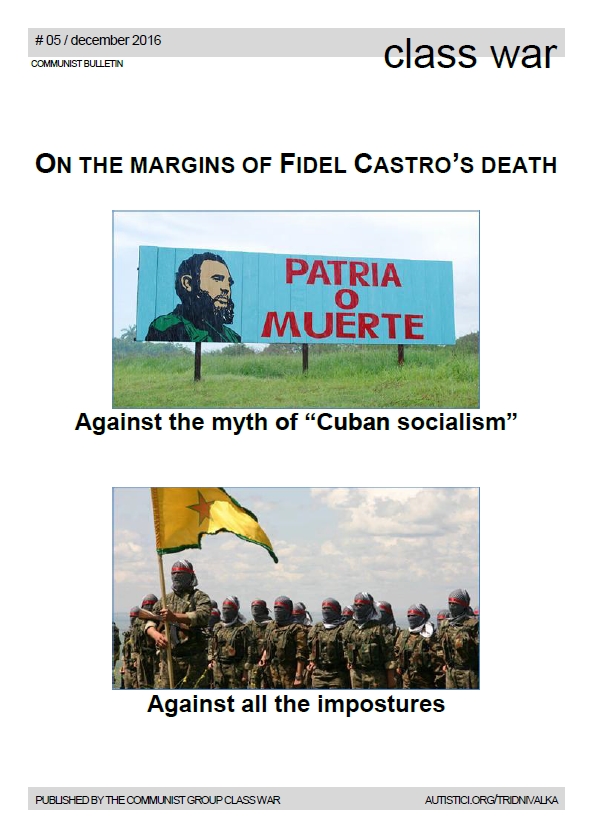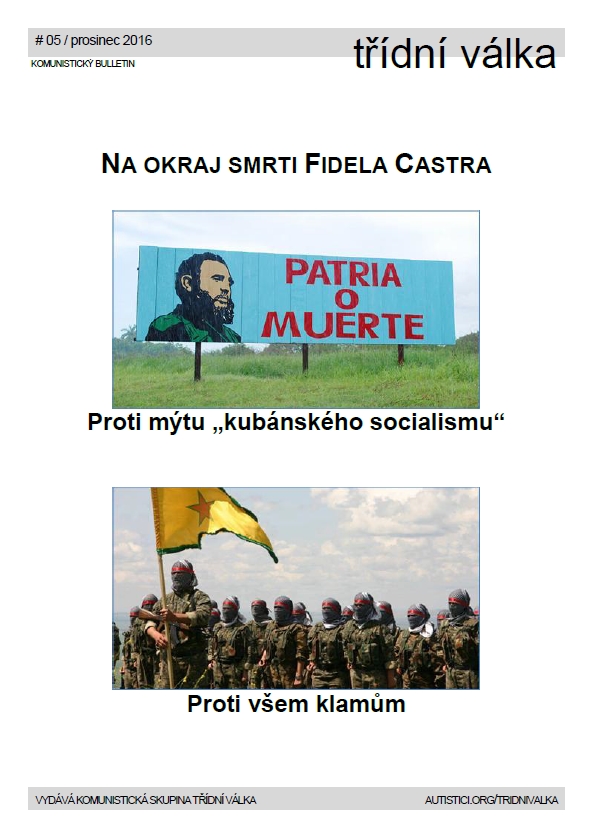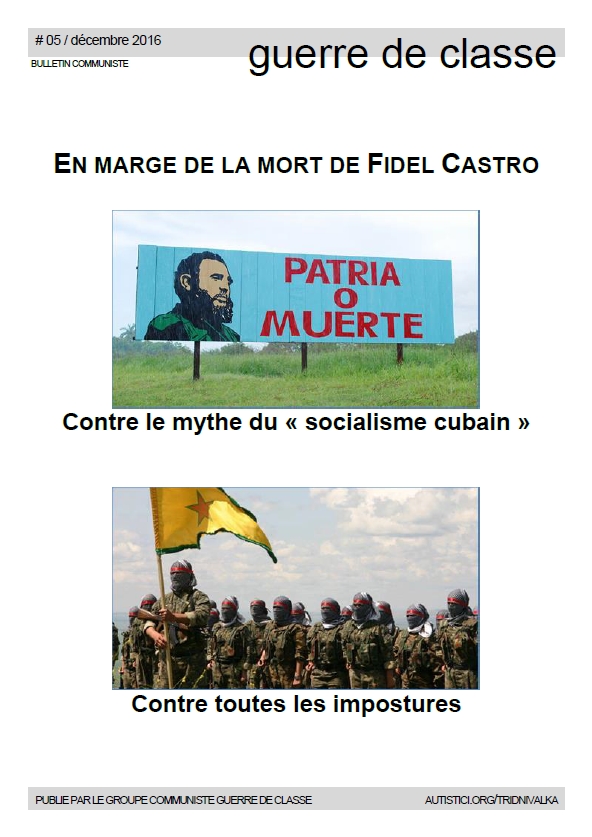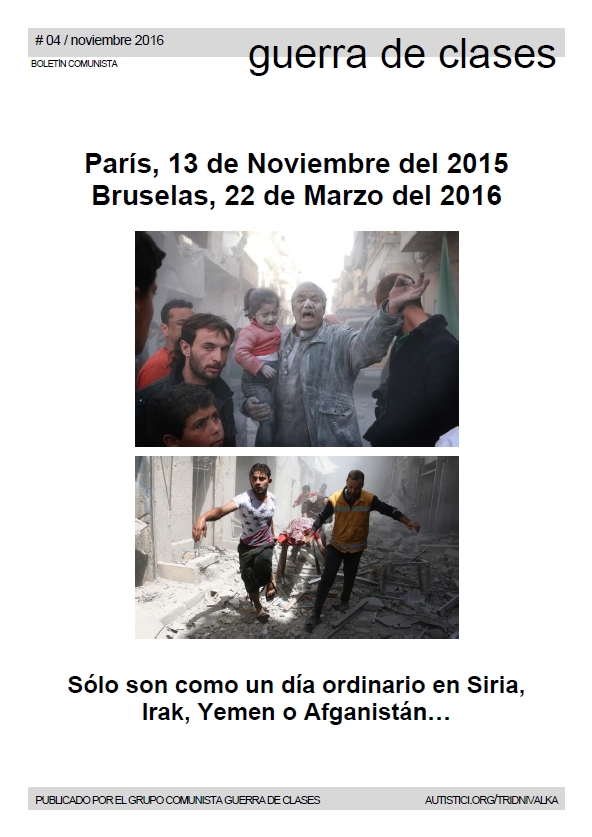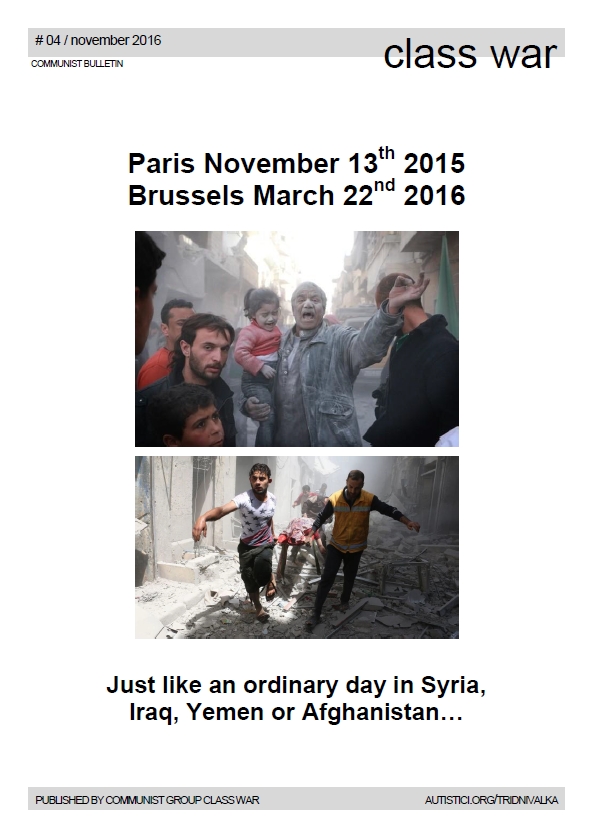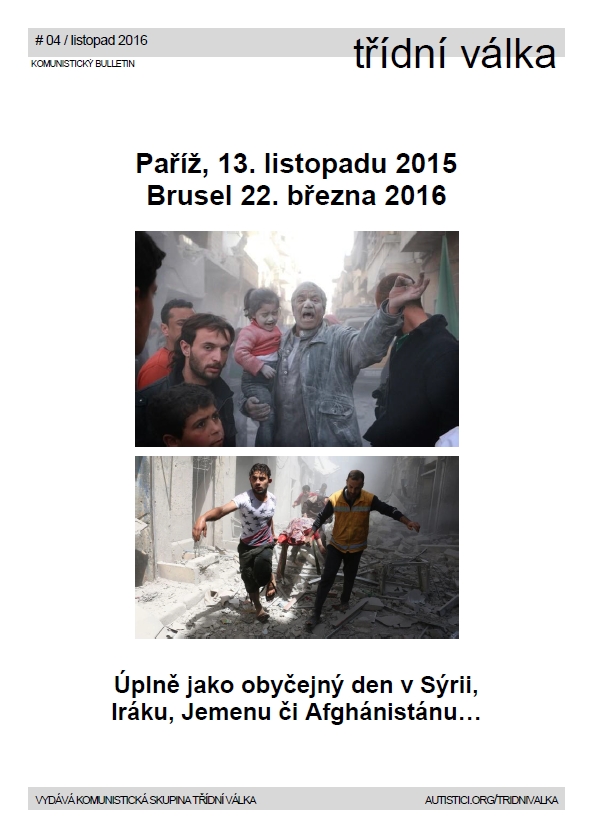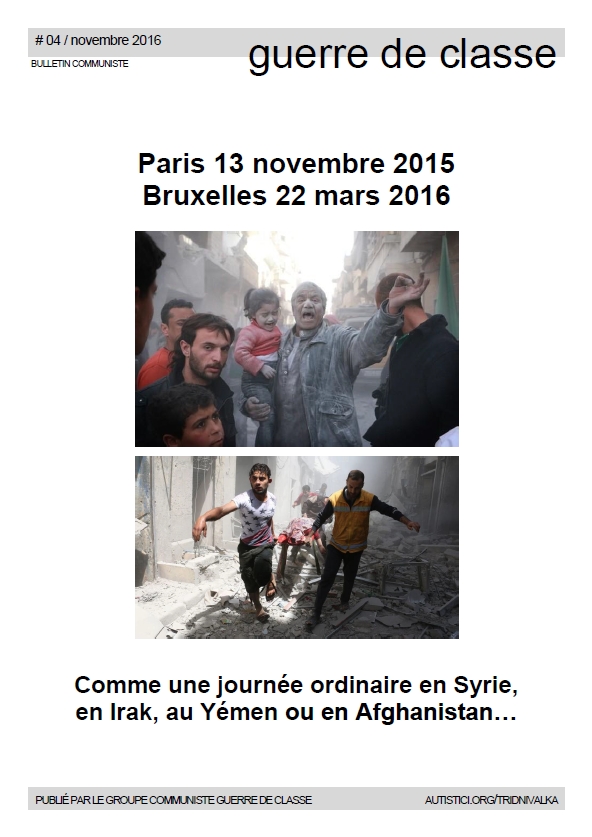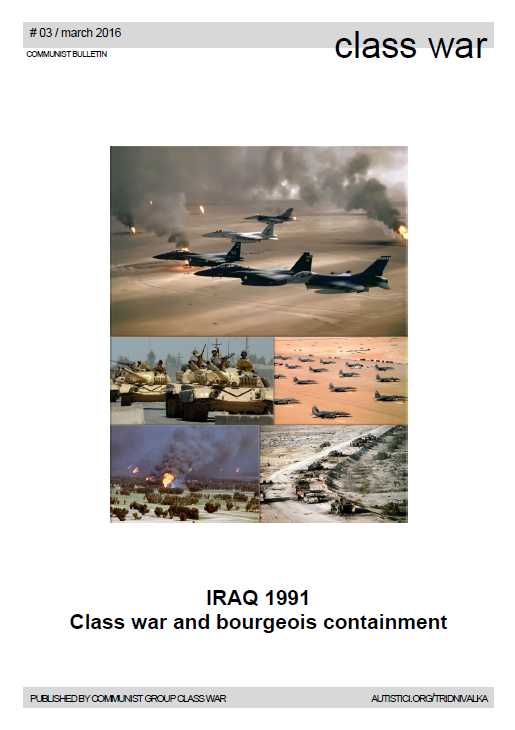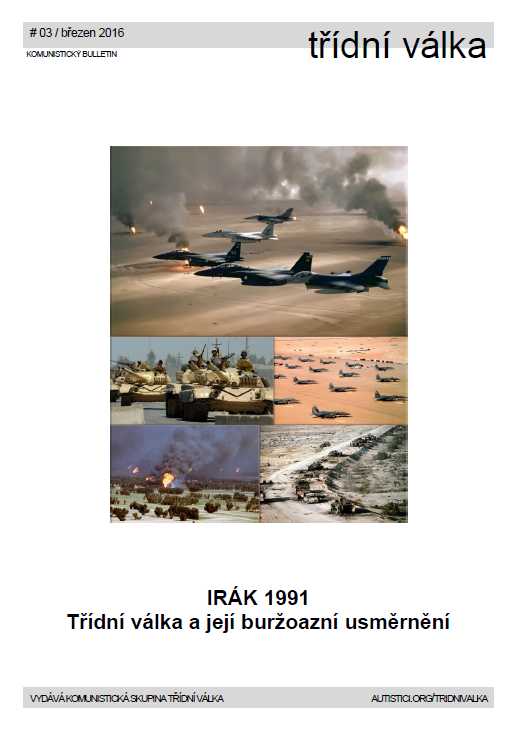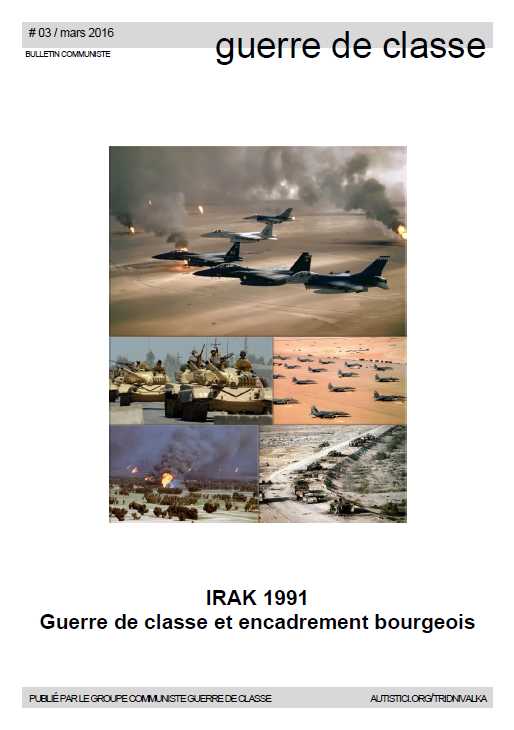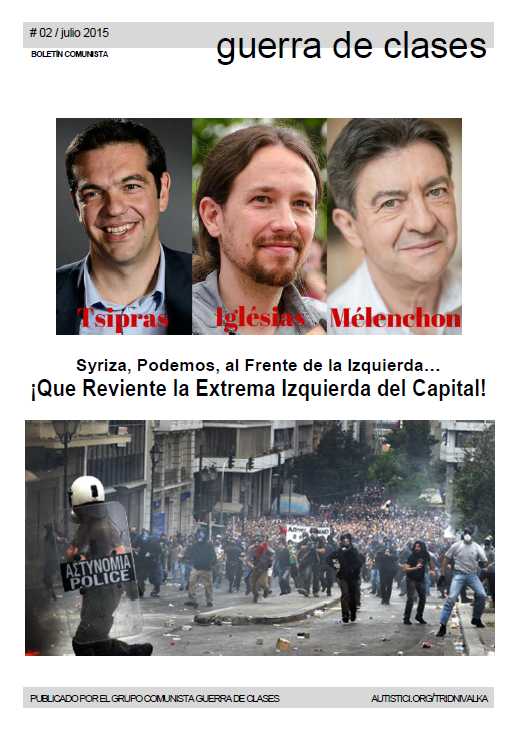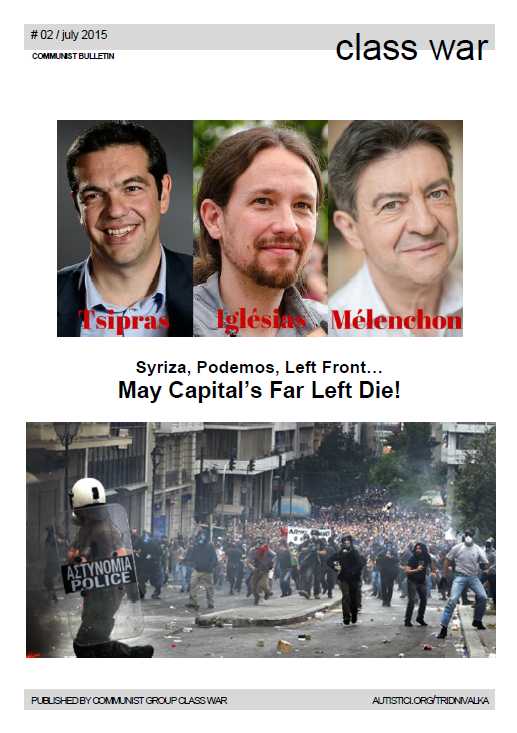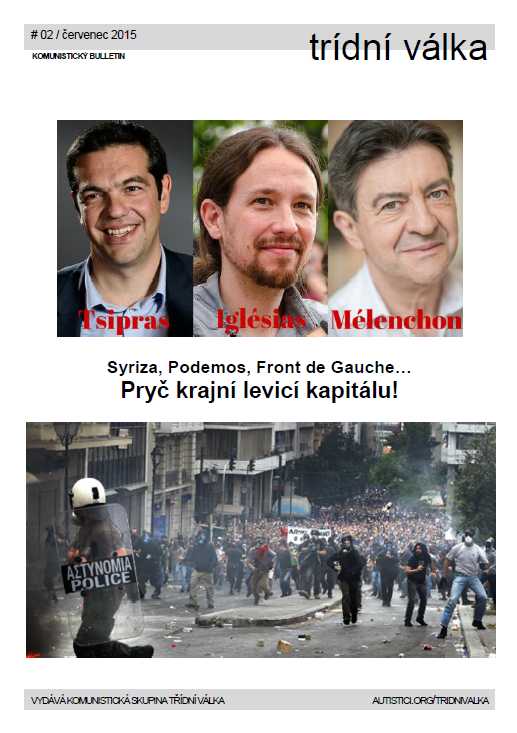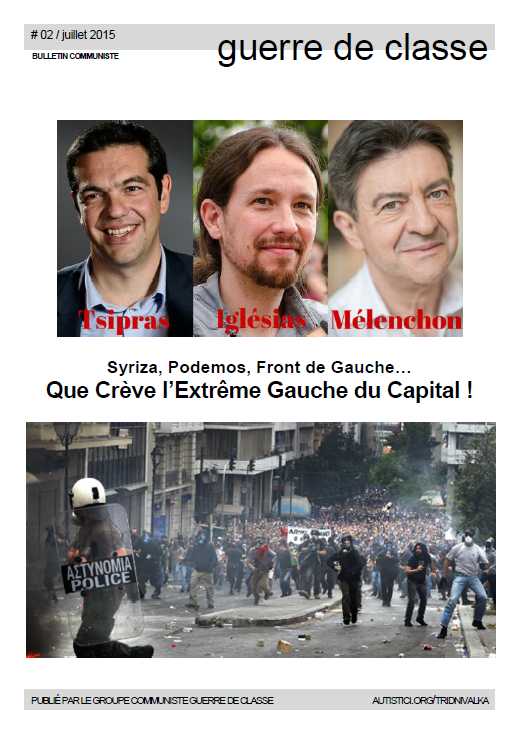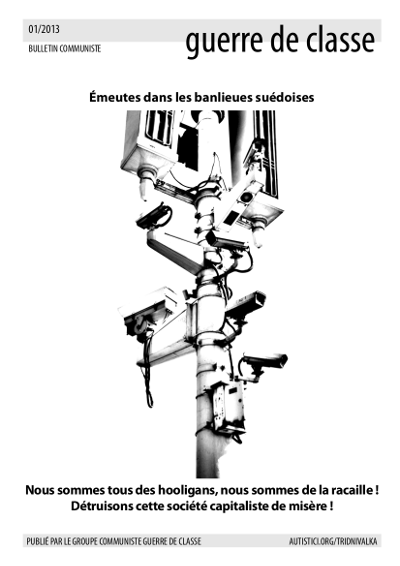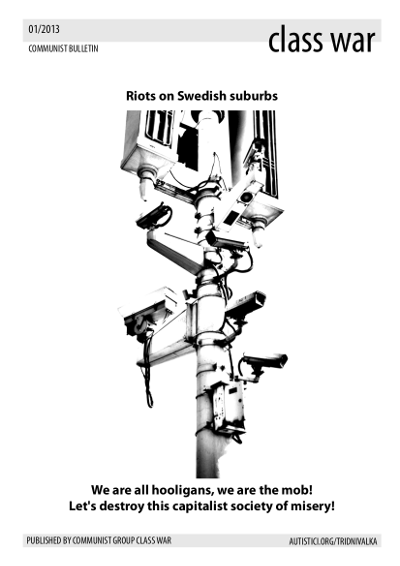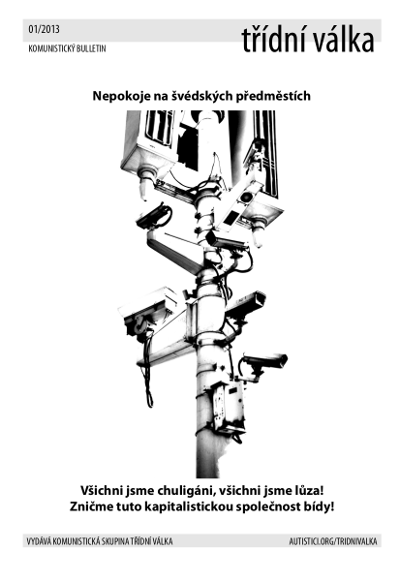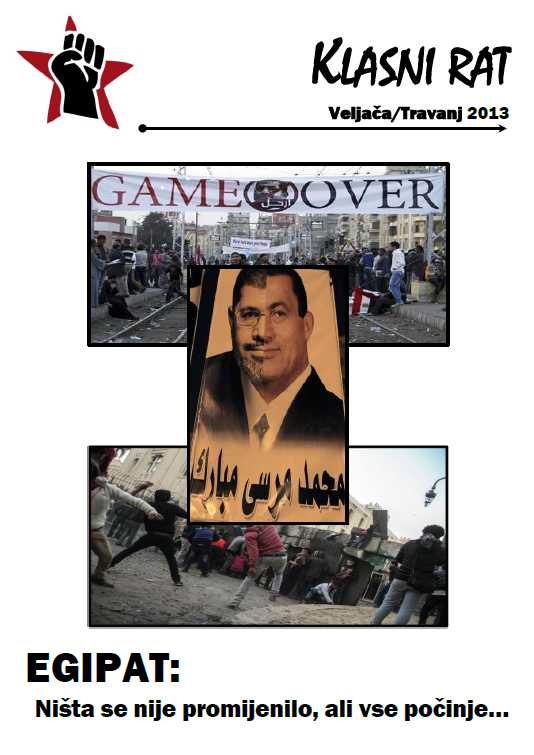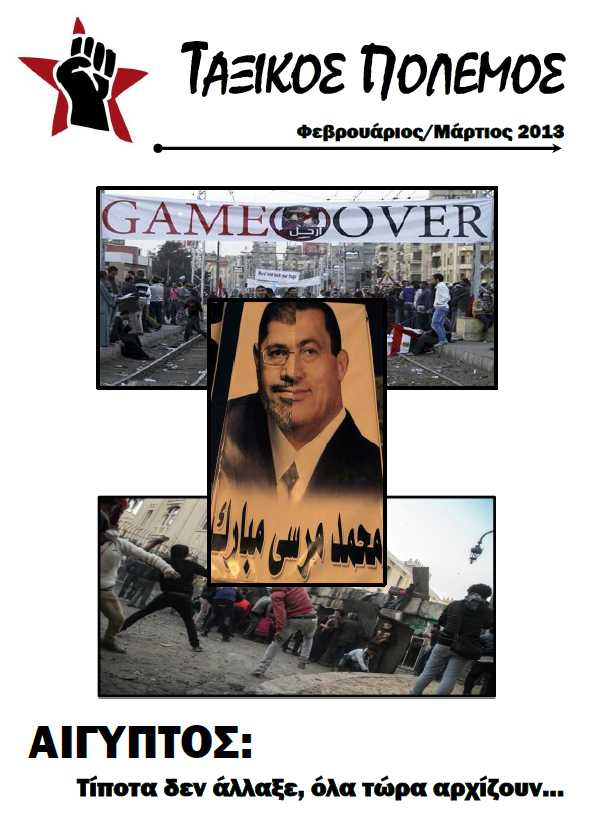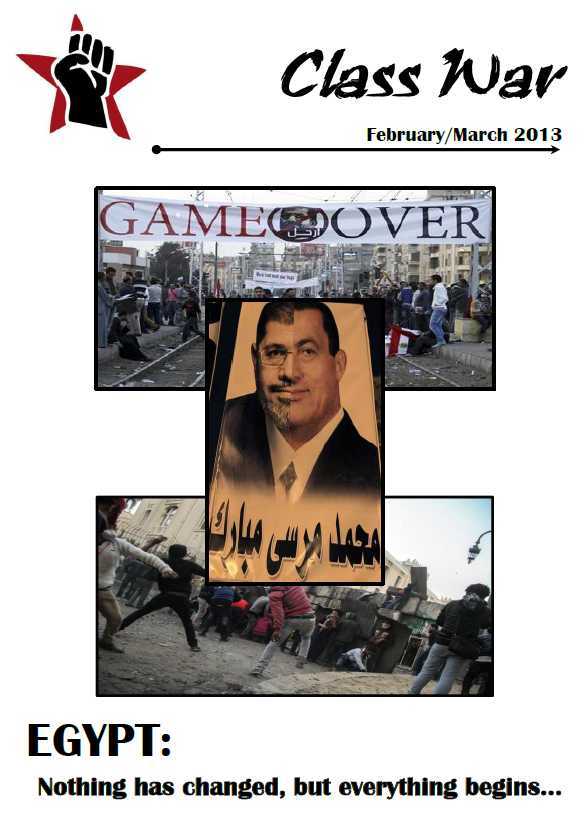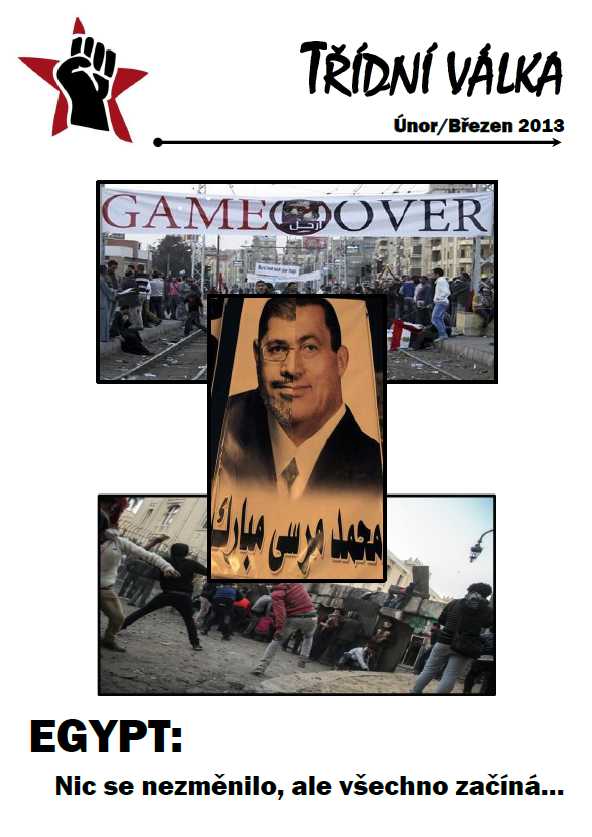| Español | English | Français | Deutsch |
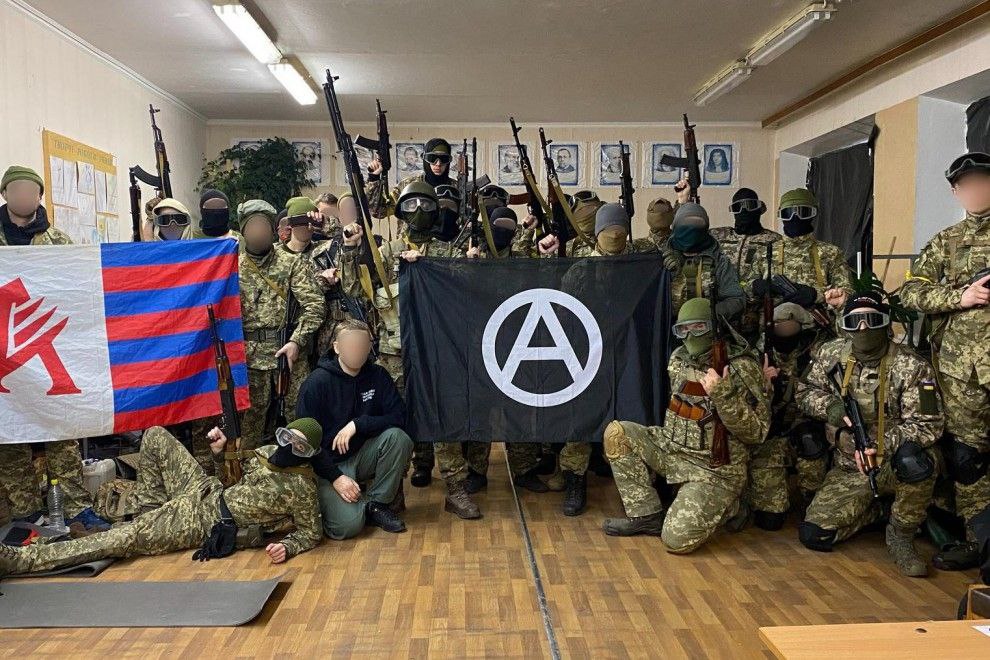
CW’s presentation:
Here we publish the Barbaria group’s latest contribution on the war in Ukraine and the struggle against the two bourgeois camps involved. Barbaria correctly reaffirms the only proletarian alternative to the negation of our humanity, whether at work or at war: revolutionary defeatism and the transformation of the capitalist war between States into a revolutionary war between classes.
However, there is a problem that we find hard to swallow: we refuse to follow the comrades of the Barbaria group when they quote Lenin (even if the quotation may be correct), as if this figure had been a comrade of our class, of our party, as if he (and his party as a political structuring) had not been, in all the processes in which our class tried to emerge from the void of its alienation, one of the most radical elements of historical social democracy (i.e., the bourgeois party for the workers) and thus of the reconstitution of the State in Russia shaken by the wave of proletarian insurrection.
Moreover, as far as Lenin’s role in the anti-war struggle is concerned, we simply affirm that neither the Zimmerwald Conference, which was in fact a meeting of the “non-warmongering” and pacifist international social-democracy, nor even the so-called “Zimmerwald Left”, which only had the color of revolution without really having any of its attributes, represented any kind of genuine response from our class to the global carnage. On the other hand, we do indeed claim all the communist (and/or anarchist) ruptures that will affirm themselves outside and against the fact to bring the proletariat into line.
And consequently, we also refuse to consider the group Matériaux critiques (Critical Materials) as “comrades”, as Barbaria’s text asserts. Whatever the importance of certain statements made by this group, it has never, ever, truly broken with Leninism, with Bolshevism – quite the contrary!
That being said, we hope you will enjoy reading this contribution…
Class War – May 29th, 2023
Revolutionary defeatism and its enemies
Source in English: https://barbaria.net/2023/06/02/revolutionary-deafitism-and-its-enemies/
“Shamed, disgraced, swimming in blood and dripping with filth: this is how we see capitalist society. Not as we always see it, playing roles of peace and righteousness, order, philosophy, ethics, but as a vociferous beast, an orgy of anarchy, pestilent mist, devastator of culture and humanity: thus it appears to us in all its horrifying crudity.”
Rosa Luxemburg
Introduction
A year into the Ukrainian war, in light of the course of events, it should be more evident than ever that this is an imperialist war. We have seen how, progressively, a greater number of states have become more and more involved in the massacre of Ukrainian and Russian proletarians for the defense of their geopolitical interests. In this context, it should be more evident than ever what are the revolutionary positions to defend regarding the war. However, this is not always the case. Within some currents which claim to be revolutionary, campist positions continue to be affirmed on the basis of the most diverse arguments which deny revolutionary defeatism and, therefore, the past lessons of our tradition.
In our understanding, these currents, by choosing an imperialist side, have decided to turn their backs on internationalism and the principle of class independence and, with this, have automatically abandoned the revolutionary camp. In this text, we propose to give an account of the arguments of organizations which without coming from the left of capital separate themselves from class positions by abandoning the positions of revolutionary defeatism, as well as those of other organizations which do come from the left of capital and which by not breaking with the ideological counterrevolution, reproduce the campist arguments of always choosing a lesser evil within the inter-capitalist conflicts.
The campist positions
Supporting the Ukrainian people: the workerist fetishism of self-organization
One of the arguments that has been used to defend a pro-Ukrainian campist position is the idea that one should be in solidarity with the Ukrainian people who are self-organizing for the defense of their homes and land. In the text of John Garvey published in the magazine Insurgent Notes he says he supports not the Ukrainian state but the Ukrainian people, the Ukrainian workers self-organized in militias against the offensive of the Russian state. In Avtonom they emphasize that not only the Ukrainian army fights against the Russian army, but also the territorial defense units: ordinary people who now have weapons and could keep them from now on and demand respect from the authorities.
The ties that these ordinary armed people are weaving fighting together with their bourgeoisie to defend the Ukrainian state are not going to disappear overnight. Their experience of collaboration against an external enemy is not going to lead the proletariat, once the war is over, to fight against its bourgeoisie, however armed it may be. History has shown that interclass collaboration in defense of the state in war does not favor a greater class struggle but the opposite: the popular fronts and the victory of the Allies in World War II did not lead to a wave of revolutions but contributed to nullify the class struggle; and the same happened in the anti-colonial wars of national independence. On the other hand, the proletarian revolution did go hand in hand with the revolutionary defeatism that managed to put an end to the First World War.
Indeed, there are self-organized militias calling themselves anarchists formed by sociologically proletarian people. However, proletarian people do not always act in a revolutionary sense, they do not always act as proletariat, as a class, no matter how many radical denominations they identify themselves with. The proletariat only constitutes itself as a class to the extent that it achieves class independence, appropriates its doctrine and adheres to its historical program. Insofar as these militias do not turn their arms against the Ukrainian state and its bourgeoisie but defend it and depend on it, supporting them means directly supporting interclassism and the defense of the bourgeois state. And this is the opposite of defending the revolution.
We regret that some groups that think they are revolutionary are ready to exchange the principles of class independence and internationalism for workerist support for any practical activity in which the sociological working class is present even if it goes directly against the historical and immediate interests of the proletariat. In this situation, we consider it necessary to criticize these positions which, defending these forms of self-organization, end up supporting an interclassism which undermines the real possibility of the self-organization of the class. It is necessary to clearly oppose these self-styled libertarian organizations in Ukraine such as RevDia, Black Flag or Black Headquarter, which have armed and organized themselves into militias to fight side by side with their bourgeoisie for the defense of the territory against the Russian invasion, as well as initiatives such as Solidarity Collectives, previously Operation Solidarity, a network that collects funds to arm “non-authoritarian” anti-fascist and anarchist battalions in Ukraine. These organizations must be seen as enemies of our class, as they actively work to keep Russian and Ukrainian proletarians killing each other instead of uniting and confronting their real oppressors.
Solidarity with lesser imperialism
There are also those who justify their pro-Ukrainian defencist positions by arguing that this war is only imperialist on one side. It would be an imperialist country, Russia, subjugating a smaller country, Ukraine, which is simply trying to defend itself. For example, the Militant Anarchist group states:
“All states are concentration camps. But what is happening now in Ukraine goes beyond this simple formula, and the principle that every anarchist must fight for the defeat of his country in the war. Because this is not simply a war between two broadly similar powers for the redistribution of spheres of influence of capital (…). What is happening in Ukraine now is an act of imperialist aggression.”
Since it is not a war between equal powers, Militant Anarchist, like the Avtonom group or the article quoted from Insurgent Notes, have concluded that the correct thing to do was to show solidarity with the weaker power and its defense of its territory against the Russian invasion; to show solidarity – they will say – with the Ukrainian people, with the people defending their land and their homes. But what kind of solidarity is that which sends the proletariat to die and kill other proletarians for the national bourgeois interests, even if it is a weak nation? Solidarity to defend a state which forbids men to flee the country to safety, forcing them to fight and die for the fatherland? With whom are they really showing solidarity? Certainly not with the proletariat.
For us, solidarity is the comradeship between Russian and Ukrainian proletarians against the imperialist war, against their respective bourgeoisies. The mass protests in Russia, with thousands of arrests; the disobedience, desertion and flight in the face of forced mobilization in both countries; or the railway sabotage in Belarus, etc.; these are signs of internationalist solidarity and proletarian instinct. We support those who oppose their ruling classes, boycott their plans and refuse to kill or be killed in the name of the nation. This implies a critique of all national bourgeoisies and, therefore, no solidarity with any in the name of a lesser evil.
It is not a question of making a moralistic critique of the actions of the Russian or Ukrainian government or of the US and European governments, but of understanding the intrinsically imperialist tendency of every state, also of the smaller or “subaltern” states like Ukraine. Imperialism is the political and international expression of the accumulation of capital, of world capitalist competition. Every state has a capital and a territory to defend, a bourgeoisie in struggle with other bourgeoisies to appropriate its share of surplus value and to have access to natural resources and a certain labor force. On certain occasions, capitalist competition pushes states to wage war, both in the case of large or dominant states and in the case of small or subaltern states. Both dominant and subordinate states are imperialist and will fight their wars against other states sacrificing the lives of their proletariat to protect the interests of their bourgeoisies.
Indeed, it is not a war between equal powers and yet this does not mean that it is not an imperialist war and should not make us doubt about the relevance of revolutionary defeatism. On the other hand, we should not forget that the present war is not only between Russia and Ukraine, but that the whole Western imperialist bloc is also involved in the defense of the Ukrainian state. In any case, we cannot choose an imperialism for the fact of being minor or defend a state for the fact of having been the invaded one. Nor is it a question of thinking under what circumstances a state has the right to use bellicose means – in the face of an aggression on its territory, for example – and under what circumstances it does not, what measures are lawful and what are not, and, then, on the basis of all this, to choose the supposedly more “just” side. Let us leave this to the deliberations of bourgeois theoreticians, since it does us little service. As we already argued in Why Revolutionary Defeatism, the Ukrainian proletariat, “does not defend its existence in the imperialist war, but becomes cannon fodder for interests which are not its own: they are those of the Ukrainian bourgeoisie and those of the Western imperialist bloc which is behind it”. We know that every state will always go against the proletariat and that the only revolutionary side is that of the proletariat in struggle against its own state and bourgeoisie. That is why, in any imperialist war, the only revolutionary position is revolutionary defeatism: to turn the imperialist war into class war.
The tactic against principles: defend Ukrainian democracy against authoritarian Russia.
As during World War II, the question of the lesser evil embodied in the anti-fascist discourse is the leftist fuel to defend the imperialist carnage in favor of one of the two sides. In this case, the slogan of Spanish Stalinism during 1936 of “first win the war and then make the revolution” reappears and with it the alliance with the most progressive bourgeoisie. So what would have to be done is to fight against Putin since Russia is an authoritarian or directly fascist regime, and, therefore, Putin’s victory would result in a much worse situation than the present one and the capacity of the revolutionaries to act would be much less. This is how John Garvey explains it to us in the American magazine Insurgent notes:
“On the other hand, it is essential that those who believe that each of the states at war is as bad as the other and that all nationalism is poisonous join in the arguments. We need to do away with false equivalents: a bourgeois republic, marred by excessive corruption, is not the same as a quasi-fascist autocracy. In the one, politics is possible; in the other, nothing but mindless consumption and collaboration is the rule of the day.”
The same arguments have always been used by the bourgeoisie. The same arguments that anti-fascism has always used: there is always a lesser evil, a bourgeoisie to defend for the sake of a supposed future that never comes and never will come because the break with revolutionary principles will never create better conditions for the proletariat to organize. The only possibility is the defense of revolutionary defeatism against all bourgeoisie. We revolutionaries refuse to defend the politics of the possible because that is always under the corpses of our proletarian brothers. Yes, all nationalism is poison. Yes, all defense of the national bourgeoisie implies the negation of class independence. And when we deny proletarian internationalism and class autonomy we break with any real revolutionary perspective.
For this reason, when we speak of revolutionary defeatism we do not refer to a position to be taken at a given moment but which can vary depending on the situation of the class struggle. It is not a tactical question but the only weapon we have as a class to confront as revolutionaries the imperialist conflicts, any other alternative always leads to collaboration with the national bourgeoisie in defense of its interests. In this sense, nothing better than to let speak those who renounce a class policy in defense of an imperialist side. Specifically, to a Russian volunteer of the International Antiauthoritarian Forces of Ukraine who gives this opinion on defeatism:
“Revolutionary defeatism, NATO proxy war against Russia for me are quite insulting foreign myths for those who know what the Russian world brings. The society is almost united in its perception of the invasion as an attempt to oppress the people.”
Here it is quite explicitly what we mean when we speak of abandoning the interests of the proletariat. We are told class antagonisms have all but disappeared – all are united harmoniously in sacred union under the national flag – despite that during the same interview there is talk of the problems of the Russian volunteers with the Ukrainian authorities because they are Russians. And we should not expect otherwise, since in their national Eden there is no place for internationalism, given that the fundamental antagonism is national and not class-based. Better the national bourgeoisie than the foreign proletariat. Defending interclassism and the disappearance of any hint of class independence to avoid the Russian victory will not help to extend the class struggle when the war ends, nor will it help revolutionaries to be in a better position among the proletariat because we have sacrificed our principles for fleeting influence.
“Neither Putin nor NATO, but…”
Under this slogan which seemingly denounces the imperialist character of the war between blocs hides the support for the side opposed to that of the United States, which becomes the incarnation of capitalism. It is the same policy of the lesser evil in which the worst of the evils would be NATO as the armed wing of U.S. imperialism. In this case, instead of putting the spotlight on the Ukrainian “people” or directly on Putin’s authoritarian regime, what we should be talking about is NATO’s imperialist expansion towards the East.
Under this perspective, imperialism is fractured, placing the United States, and therefore NATO, at the top, to be followed by other imperialist powers, but of lesser importance. In this way, NATO and its interests are the cause of the war and as a consequence would be Russia’s response. In this sense, the analysis of the war in the last congress of the Spanish section of the International Marxist Current seems very relevant to us:
“This is not a war of Russia against Ukraine, it is a war of Russia against NATO and NATO is the imperialism of the United States. (…) It is an inter-imperialist war, but we have to be careful that the two imperialist powers involved in this war are not exactly the same. The United States is the most powerful and reactionary imperialist power in the world. Russia is an imperialist power that has imperialist ambitions but at the regional level.”
A similar movement is the one that from the US and the United States has been moving in the same direction. A similar movement is that which from the publications of the Socialist Movement in Euskadi defends the People’s Republics of Donbass as a third position differentiated from the support to Russia and Ukraine (which is obviously impossible, the republics of Donbass were always an appendage of Russian Imperialism). According to it, the Donbass Republics, which are in the East of Ukraine and on the border with Russia, would be defending their right to self-determination in the face of the increasing Western influence and the weight of fascism in the Euromaidan. Consequently, revolutionaries should not only support their struggle for independence but stand in solidarity with their anti-fascist resistance:
“Faced with this ethnocide led from the West, different collectives under attack united to defend themselves: anti-fascists, those who kept a good memory of the USSR, those who felt they belonged to Russia… but also those people who were persecuted for the simple fact of speaking Russian or those who did not think it was fair to endure poverty for living in the East. Thus, as it has been done in most Eastern countries, this question of class strata and multiple interests has been reduced to the mere struggle between “pro-Russian” and “pro-European”.”
But this position breaks head-on with the two basic principles for revolutionaries: class independence and internationalism. The defense of the right of self-determination inevitably entails an interclassist position where class independence is subordinated to national interests, that is, to its national bourgeoisie. Thus, the proletariat instead of fighting against its exploitation should fight for a new state to administer that exploitation. On the other hand, any process of creation of a new state will inevitably imply rapprochement with one of the imperialist powers in search of economic and military protection, as we can now clearly see in the war. In this case, the Donbass Republics have to choose Russia’s imperialist side in the conflict and those who defend them will have to support one of the imperialist sides in the war. There is no third way:
“And what is the reaction of the Western “left” in the face of all this? In the Spanish state, as in many other places, the anti-Russian position has been a priority, before that of denouncing the fascism that is rampant in Kiev and the bombings in the East. The same people who, in the elections, are full of mouths against fascism in opposition to their rivals, have played into NATO’s hands by defending against “evil” Russia a government that has come to power in the heart of Europe with the explicit support of the Nazis. Meanwhile, the militias of the Donetsk and Lugansk People’s Republics are facing a professional army that has applied for NATO membership. In a war in which, due to a lack of resources, it is impossible for them to win from the beginning, they have no choice but to resist on the border with what they have at their disposal, making death and poverty their daily life.”
The only possibility in the face of death and poverty is to fight the war, so they say, time and again. However, the way out of this crucible of misery, poverty, and war, is not for the proletariat to join the chorus of bourgeois in proclaiming a so-called the right of self-determination, but rather revolutionary defeatism. The proletariat can only fight against its exploitation if it maintains a position of class independence against any imperialist side and any national project.
As the comrades of Matériaux Critiques say, anti-imperialism is the most harmful by-product of imperialism and under the umbrella of anti-imperialism everything fits because it simply gives a red varnish to the position favorable to an imperialist camp. Thus, in the end, it is the same to say that Russia is not imperialist or that it is only defending the right of self-determination of the Donbass republics as it is to put the spotlight on NATO as the greatest imperialist power, since the consequence in practice is the same, either in a more direct way or through brainy geopolitical analysis. As revolutionaries, we can only maintain a position of revolutionary defeatism.
Revolutionary defeatism: the only alternative
We have already seen the different ways in which defencism is expressed and attempts are made to justify support for one of the contending camps under a so-called revolutionary pretext. We have also seen that under the guise of denouncing the inter-imperialist conflict, NATO is placed with respect to Russia or Russia with respect to Ukraine as a greater imperialism and, therefore, the class barrier which must be, at all times, impenetrable, is blurred.
When we speak of revolutionary defeatism, we refer to the transformation of imperialist war into class civil war. It could be said that it is an empty phrase, a mere slogan without real political content behind it and, even, an accurate slogan but only for moments of strong class struggle. But reality shows us the opposite, the actuality of revolutionary defeatism is greater than ever, since it is the manifestation of the two foundations of all revolutionary politics: class independence and internationalism. The opposite of this still has the same character as what Lenin denounced in 1915:
“Today, unity with the opportunists means in fact the subordination of the working class to “its” national bourgeoisie and the alliance with it to oppress other nations and to fight for the privileges of every great power, which represents the split of the revolutionary proletariat of all countries.”
It is important to stress the centrality of this programmatic position since, as we have explained in the article, although in different forms, to relent on this matter always implies the subordination of the proletariat to its national bourgeoisie and the fallacious suspension of the class struggle for the interests of the nation. The proletariat ceases to be a worldwide class with the same interests determined by its social position and is divided by nations with conflicting interests, since its interests are those of national capital competing in the world market. When we say that once revolutionaries position themselves with an imperialist camp there is no turning back – i.e., that they become part of the bourgeois camp – this is what we mean. That is why revolutionary defeatism is not a mere tactical question that has its usefulness in moments where the class has a revolutionary role, but a question of principle that separates the revolutionary camp from the bourgeois camp in a fundamental way. And the fact is that communists do not act according to the present moment and the capacity we have to act on the immediate, but our task is to maintain the line of the future in the present. Thus, maintaining and defending the importance of the positions serves so that the class can make them its own in the future.
